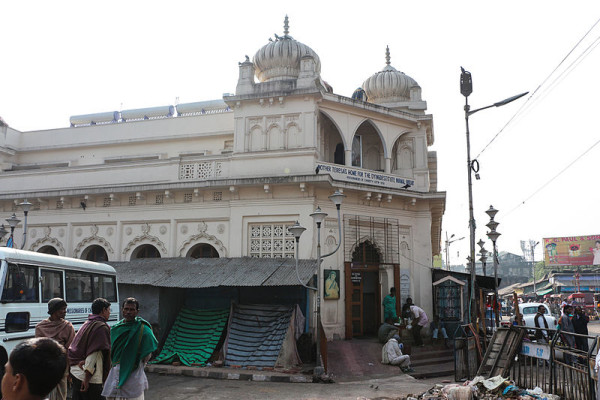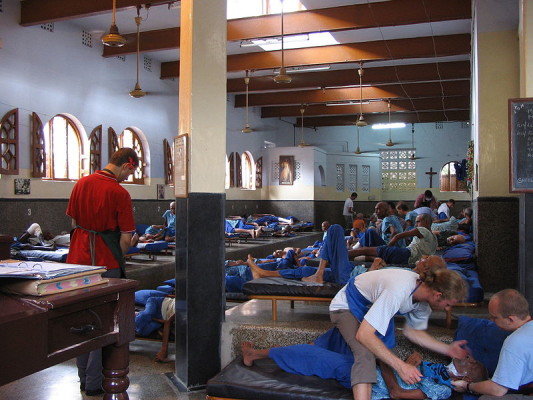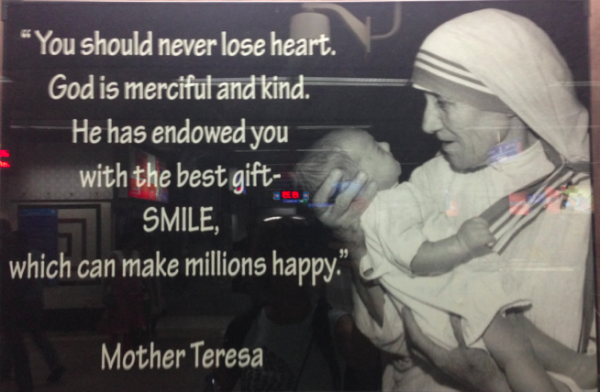Lightfoot Diaries
You are reading: Suffering Touches Everyone, I don’t know why. The Fantastic World of LeAnne DowningSuffering Touches Everyone, I don’t know why.
 Written by LeAnne Downing
Written by LeAnne Downing
Suffering is a river that flows over the world and touches everyone. I don’t know why.
I’m finishing up two weeks working with Mother Teresa’s Home for the Dying Destitute and helping the sisters who came after her. These sisters take a vow to give “wholehearted free service to the poorest of the poor.” In Mother Teresa’s words they serve “the hungry, the naked, the homeless, the crippled, the blind, the lepers, all those people who feel unwanted, unloved, uncared for throughout society, people that have become a burden to the society and are shunned by everyone.” The order is named the Missionaries of Charity, but I call them Angels.
My mornings start by hand washing laundry with other volunteers. Piles of sheets and gowns and underwear stack high and we slosh it all around in big metal buckets and soapy water that turns brown because god knows what kind of germs are in there. I concern myself with the germs because I’m a nurse, it’s what we do. So everyday we wash the laundry for 150 women in soapy water that turns to brown-germ soup, rinse it, then haul it in smaller buckets up four flights of stairs to a great big roof strung with lines and lines of rope and hang it out to dry.
Mother Teresa set up the Home for the Dying Destitute in 1950, giving the poor of Calcutta who would literally be dying on the street in the middle of foot traffic and in front of everyone, a place to die with dignity. She found a big church, filled it with beds and kept the sick who came clean, dry and fed, and let them die in peace. She won a Nobel Prize for her work and the hearts of the world. Now the Missionaries of Charity are in many countries but Kolkata is ground zero and a special place to be hanging up the laundry of the destitute dying.
I usually start hanging out the pink and yellow checked head scarfs. The resident in charge of the scarves has bent, broken hands and a deep base voice that makes sounds but no words. She bends over and sorts the laundry with one crooked pointer finger, the only thing on her hands that still works. The first time I helped her with the head scarfs she looked skeptically at my work. The next day though, she wouldn’t let me leave but called out…”Heb!” (help). I hung the scarves in a fraction of the time she could have, and on day three Padna and I became a team, she handing me the scarves and me hanging them.
After laundry and because I’m a nurse, I walk to the medical office where seven women are sitting in a line for their wounds to be cared for. I help the sisters bandage and tape, then go back to the larger group of women in wheel chairs and on benches waiting for me to massage lice ridden heads and scaly arms with oil. Touch is a soothing balm and they have very little of it. After awhile, chapati and beans are delivered by nuns for lunch, we feed them and put them to bed for rest, then wash all the dishes before afternoon break.
This place, it feels like home, like every nursing-home I’ve ever been in. I think… “This is us. All of us. We grow old the same, we wrinkle the same, we hurt the same, we are all are just the same.”
A few days ago I was pulled off laundry duty early because the sisters needed a nurse. An old woman had been abandoned on the street by her family, they didn’t want her any more. “It happens all the time,” the nuns said, “it is the way here”. A person becomes aged and a burden, unwanted old people are left at the gate. This woman had been burned with acid by her daughter-in-law before she was dumped. Maybe it was because of a quarrel or maybe something else but either way, the acid scorched her skin and this morning she has thick black third degree burns over her back, chest and arms, charred to the bone.
I want to judge, to declare this thing terrible from my high moral sensitivities. But really, do I know? Do any of us know what it is to live in this culture and in poverty? I wonder, did she know this was coming, that this was her fate? Did she drop some unwanted mother-in-law off on the street years before?
Anyway, it’s going to be a long, long time of deep suffering for her. She groans and cries and wishes to be dead. “Why can’t I die? Why can’t I die?” This is her chant as we work on the raw exposed nerves of her burned legs and arms and torso. Hospitals take away the burned skin with surgery and apply skin grafts, but here we can only do simple things. So I teach the sisters to remove dead tissue and wash the wounds and prevent infection. This morning the patient is screaming and screaming even though we are being gentle, and all the while Mass is happening in a room right beside us. The sisters in mass are singing hymns and it’s as if the air is lifted up with the songs of angels, and settles around the old woman. Screaming and the singing of angles. Then the Sister cradling the old woman’s head bends close and starts her own lullaby, right into the woman’s ear, who clings to the nun’s robe and becomes quiet, as if the song is absorbing her suffering.
Another nun, Matia Teresa Carloni, was said to literally take into her body and endure the suffering of others. In 1954 documents say she began suffering in place of church leaders to help them minister more fully to others in need. It is said that if she agreed to carry the burden of a suffering priest or nun, their suffering would be passed to her, she would suffer, they would be free. I have a friend, not catholic, not even particularly religious, who says he can absorb others pain, he hugs them and takes it away. I’ve been thinking about this a lot, because in the Yin and Yang of life, it seems like the suffering side could use a little relief. So, when I massage a woman’s head and fix her hair, I wonder if I’m doing it. If I’m somehow absorbing their suffering. The women think so. Sometimes they bow at my feet, then kiss their praying hands after they’ve touched my feet, and then they kiss my head. I’ve been told it’s because they are receiving a blessing from me. Blessed energy. When I do laundry, is that absorbing suffering also? The laundry feels like it’s absorbing My suffering. It grounds me, connects me to the sufferers and I feel blessed. I don’t even care about the germs anymore, I am blessed when I do the laundry. And now after spending an hour helping a terribly suffering burned soul, I defiantly feel that I’ve absorbed suffering. I am upset. And exhausted. And royally pissed off that suffering exist at all. I’m upset. I wish I could put a good face on it all and say something like “somehow suffering is not in vain” or “suffering is a death but also the birth of something new”…but no. Suffering sucks. That is all.
Suffering is a river that flows over the whole world and touches everyone. I don’t know why.
originally published April 17, 2015


